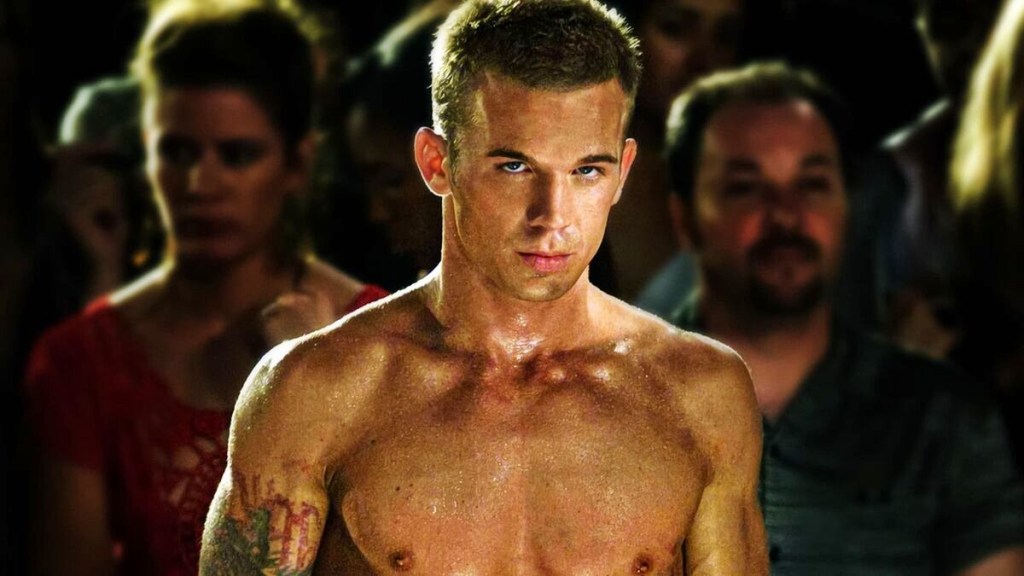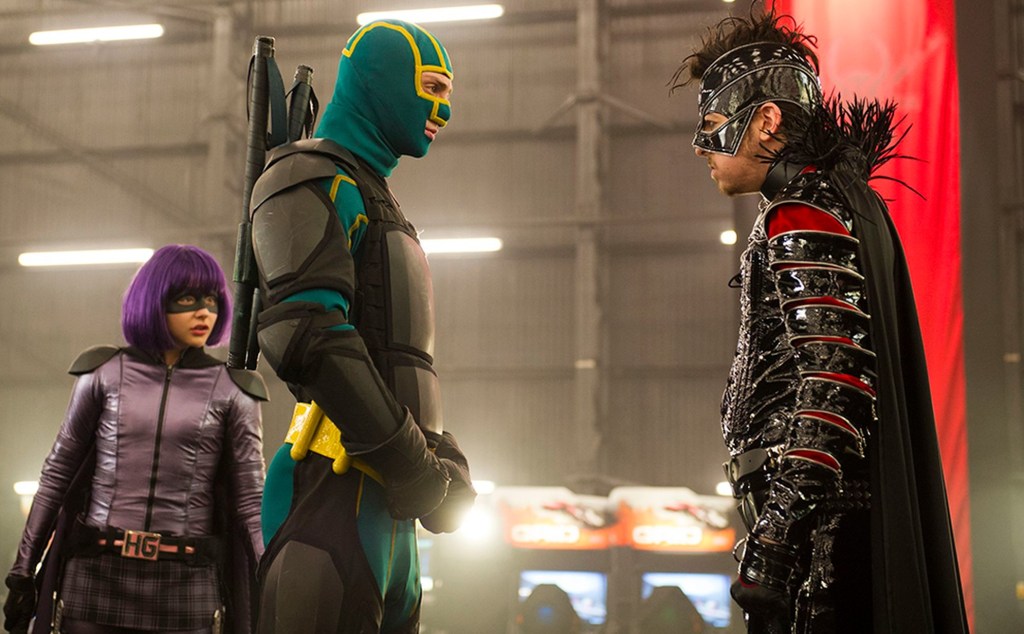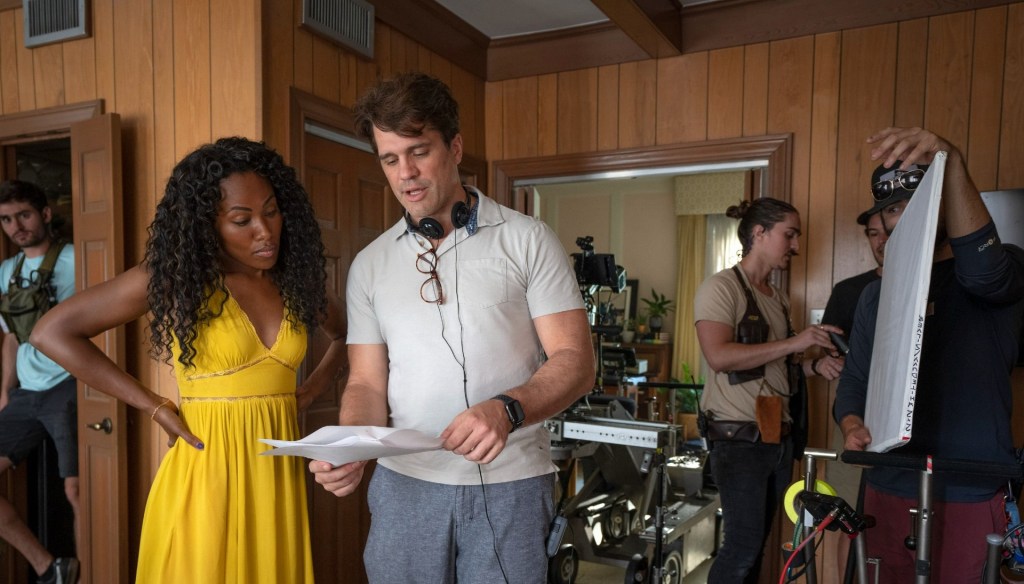Blumhouse’s latest horror movie, Imaginary, is out now, and sees a seemingly innocent teddy bear as a malevolent force that influences a young girl.
It’s the latest union of Blumhouse and director Jeff Wadlow, after Truth or Dare and Fantasy Island. ComingSoon’s Senior Editor for Horror, Neil Bolt, spoke with Wadlow about the film, and also delved into Wadlow’s journey as a filmmaker. Covering the action movie fun of making 2008’s Never Back Down, the challenging job of tackling Kick-Ass 2, and what it’s like to work with Blumhouse’s Jason Blum.
Neil Bolt: I’m really happy to get to tell you I have a real soft spot for your 2008 film Never Back Down.
Jeff Wadlow: Yes! I love hearing that!
It was a fun snapshot of its time with a Karate Kid-esque story arc. There’s a line after Jake, the protagonist, gets beaten down by the villain Ryan where Ryan goes, ‘Enjoy the Floor’ and I love the delivery of it; it’s stuck with me all these years later.
I’m very happy to hear that. I loved making that film. The cast was just fantastic. Sean Faris, Cam Gigandet, Djimon Hounsou. Evan Peters! I gave him one of his first roles there, and of course, Amber Heard. So it was fun, I love fight movies, and I didn’t write that one, but I was thrilled to sink my teeth into it. It was also a big moment for me because I’d only made one feature before that (Cry Wolf), but Never Back Down was my first Hollywood job.
It’s a bit different from the majority of your work, so looking back at it now, how do you feel about it? Do you feel affection for it because of how different it is?
Yes and No. It’s funny that you say that because it’s probably the closest to who I am as a filmmaker. I love action movies and movies with lots of energy and momentum, visually. I love the conflict that’s in your face when you have a strong rooting interest. I like the exciting visuals, like the over-the-top environment of Orlando, young attractive people at parties, and the soundtrack; I love the soundtrack!
Oh yes! That soundtrack is a proper time capsule.
Yeah, my movies now, I don’t really get any money for a soundtrack. I’m lucky if I get two needle drops! I feel like that movie is very central to who I am as a filmmaker. There’s this thing that people wanna do, and I’m not calling you out specifically here, and that’s put a director in a genre box, like ‘’What is their genre?’’ Are they a comedy director? A horror director? I like seeing movies in all different genres, so I love making films in all different genres. Actually, I view genre like a chef might view cuisine. No chef wants only to make French food their whole career. They wanna try different cuisines, investigate the pillars of each, and ask, ‘’How am I gonna put my own spin on this?’’. That’s what I like to do as a director and writer.

Yeah, and to go further on that, you can take ingredients from each and apply them to other genres the more you experiment with them. I’m glad you’ve said that because I feel the same way. I’m horror-focused in my job, but I love all genres of films and love finding aspects of each in others. You can find some special mixtures. Like you’ve done a lot of horror, and that skillset can absolutely be applicable to action when it comes to tension and intensity.
Yeah, I’ve often said I view horror as a very similar genre to action, just with the volume turned down, right? You really have to think about your shots; you’re building energy, thinking about what you’re trying to say with each moment. You’re doing that with an action sequence, obviously, but clearly, with a scare sequence, you’re using the same skillset, just with the volume turned way down. Instead of an exploding car, it’s a creaking floorboard.
Good point! You’re back at Blumhouse again with Imaginary. There must be a special relationship there to be coming back this frequently?
Yeah! After Truth or Dare and Fantasy Island, Jason (Blum) offered me a first-look deal, which I gladly took because I love working with Jason. If it were up to me, I’d never work with another producer. I certainly won’t work with another producer in this budget range!
The guy’s a living legend. He’s changing the film industry in the same way Irving Thalberg (legendary Universal producer and MGM co-creator) did. I think in 100 years, people will be studying Jason Blum the same way I studied David O. Selznick (producer screenwriter, and executive at MGM and Paramount). What he does that’s so brilliant is that he’s a producer! So many executives and producers today are just trying to direct behind the director. Someone the other day called it ‘’executive overreach!’’
But Jason doesn’t do that. He brings projects together, he functions as a true producer. I actually have a Masters degree in Producing from USC, and my main mentor in the program was this producer named Larry Turman (The Thing, The Graduate), who sadly passed away recently, and he got an Academy Award for The Graduate. He had this vast, diverse body of work, and he understood this. The producer’s job is to bring everyone together. Find a piece of material, bring everyone together, set them up to succeed, let them do their job, and then shepherd the film all the way to release. And that’s what Jason Blum does. He doesn’t wanna be a director; he’s not trying to redirect your movie with a proxy on set or coming in and giving notes on the cut. He wants you to succeed as a director, and he does everything in his power to do so.
Do you think he’s underappreciated in that regard? Budgets are generally higher for the lower-end than they once were, even if it’s still relatively low compared to most studio budgets. He’s still working on the low end, using creative means to get ahead, blooding directors, and that sort of thing. He’s got to be underappreciated in terms of his impact on the industry in that regard?
I love him; he’d certainly tell you he is underappreciated! I’m kidding, but look, in the business, people know he’s a living legend. There’s no doubt. He’s certainly done a great job marketing the Blumhouse brand. I don’t think, to your point, that we’ll be able to fully appreciate how he changed filmmaking forever until someone takes a much more serious look at his body of work.
It’s usually after a couple of decades, at least, before the retrospective appreciation begins, isn’t it?
It is the plight of the artist not to be appreciated in your own time, yeah!

Absolutely. Back to Imaginary, and from what I’ve seen, Chauncey looks quite innocent, unlike some other significant toy-based villains who have an eerie quality from the outset, was that an intentional decision?
I mean, we had a balance. We have two competing agendas. I couldn’t make it look like Annabelle; what kid would wanna have a bear like that? And trust me, we had designs where Chauncey looked like Paddington or Winnie the Pooh that were far cuter than what we landed on. Ultimately the design is a compromise. Even though he’s cute, I’m still trying to create a sense of unease in the audience when they look at him, and we did that with asymmetry. So even when he’s sat up straight, his ears are off, his eyes are off, things that give the audience a cue that something is not right here.
Yeah, I would say, from what I’ve seen, it feels subtler. It feels plain, as a teddy bear, disarmingly so.
And I really wanted him to have a neutral face because when you see the film, we do a trick I’m quite proud of, which people on Instagram have already posted things that show we’ve fooled them; I change his face out. So when he’s mad, we put a mad face on; when he’s happy; happy face. We literally take his face off between takes. There have been memes I’ve seen where people say, ‘’he looks mean in this picture!’’
Going back to one of your earlier Blumhouse films, you recently spoke about what could have been with a sequel to Truth or Dare, and while you didn’t seem to think that particular version of it was viable now, would you rule out returning in some other way?
Look, I loved the rules of that movie. One of the things I try to do as a filmmaker is create a game for the audience. What are the rules? I want you to play along. Watch as I follow the rules, subvert them, and change them up suddenly. I want you to be an active participant in this experience. So when you have a movie that is literally about a game, it’s fun to play with those rules and invite the audience into it. If there were a clever way to do that in a sequel, then yeah, I’d totally be up for it.
It’s genuinely fascinating to see simple things such as childhood games twisted in these different ways, and there have been many examples of that over the years. Like sidestepping genre here, look at the film Clue and how that uses what we know about the board game in a playful way.
And another way you can look at it is to broaden it from just games is like, lists or anything that creates a structure for your narrative. I mean, look at Fincher’s Se7en. The fun of that movie is knowing the sins that are coming and being, ‘’how are the filmmakers gonna give us what we were expecting and subvert the rules?’’
We do something similar with Imaginary, where Chauncey gives Alice this twisted scavenger hunt list, and it’s a lot of fun watching her collect the items of things off it.
A lot of drama surrounded Kick Ass 2 outside the film itself, but outside of that, how did you find the experience?

I am so grateful for that experience. You have to remember I’d only done two movies at this point. But it came at an interesting time in Hollywood as it was kind of the end of the era for the Shooter director. What I mean by that is that kind of music video style filmmaker who’d get a mountain of scripts and pick what they wanted to do, writers would get hired and fired and were sort of dispensable, and that’s how Hollywood was making movies. When I got out of film school in 2001, that era was kinda ending. There were really no more open directing assignments. In fact, Never Back Down was one of the last of those open directing assignments I can think of where a studio says, ‘’We’re making this movie, now we need a director’’. That’s over; nobody does that anymore.
My career was in trouble after Never Back Down. I was attached to all these movies, I would help these writers with the scripts, give them all my big ideas, and they would get these massive writing fees, and then if the movie didn’t get made, I’ve basically spent six months to a year working on something I didn’t get paid for. I was probably 29-30 when Never Back Down came out, and I had bills to pay and student loans to deal with. I needed to make a living and so it occurred to me to start writing again. I’d stopped writing after Cry Wolf because of some advice that was, ‘’Uhh, big Hollywood directors don’t write!’’ which turned out to be terrible advice as it was the advent of a new era of the content creator—people like J.J. Abrams, the Greg Berlanti. These people who were writing their movies, and writing other people’s movies to attach their names to them.
The ‘’Man of Many Hats’’ era!
Yeah, exactly. So I start writing to pay the bills, and I write two scripts on spec. One was Bloodshot, the Vin Diesel movie, which sold to Sony for a ton of money. They didn’t want me to direct it, so I took the paycheck and paid off those student loans. And the other movie I wrote on spec, without a deal, was Kick-Ass 2. I’d met with Matthew (Vaughn) about Bloodshot, and he asked me my thoughts about Kick-Ass 2, so I told him what I’d do with it, and he found it interesting. But then I didn’t hear from him again about it.
So I bought the comics and wrote the script, and without a deal in place or anything, I sent it to him. And he was impressed and gave me the chance to direct it. I’m very much in his debt for the opportunity itself, and I owe him a lot.
As far as the process goes…it was challenging. And I don’t think anyone would be surprised to hear that. It was just a lot of actors, a lot of history with the project. I was the new guy as I was using Matthew’s crew, so everyone had worked on the first film but me. Shot in London, I was the only American. It was a hard shoot for me, but I learned a lot and I’m proud of the movie, but to describe it as anything other than challenging would be untruthful.
Yes! Even from the outside, it was quite apparent there was a lot going on with that movie.
I mean, look at it this way. If they’re gonna give some guy an opportunity to direct who wrote the script on spec without a deal, it was clearly a bit of a hornet’s nest I was walking into.
I suppose it’s good to look back on it and think, ‘’It didn’t kill me, it didn’t kill my career, I learned a lot, and I’m better for the experience’’.
Yeah, I learned so much, I made some wonderful friendships, and I’m very proud of the final product. I wish Matthew and everyone involved in it nothing but the best, and I look forward to seeing the reboot trilogy he’s working on.
Absolutely. To cap this off, we’ve seen a plethora of playthings become evil in horror movies, but what children’s toy has untapped potential as an evil entity?
Ohh, I can’t give away ideas now, Neil! C’mon! Let’s just say that if I have an idea for one, I write it down.
A wise move to be fair.
Imaginary is in theaters now.









